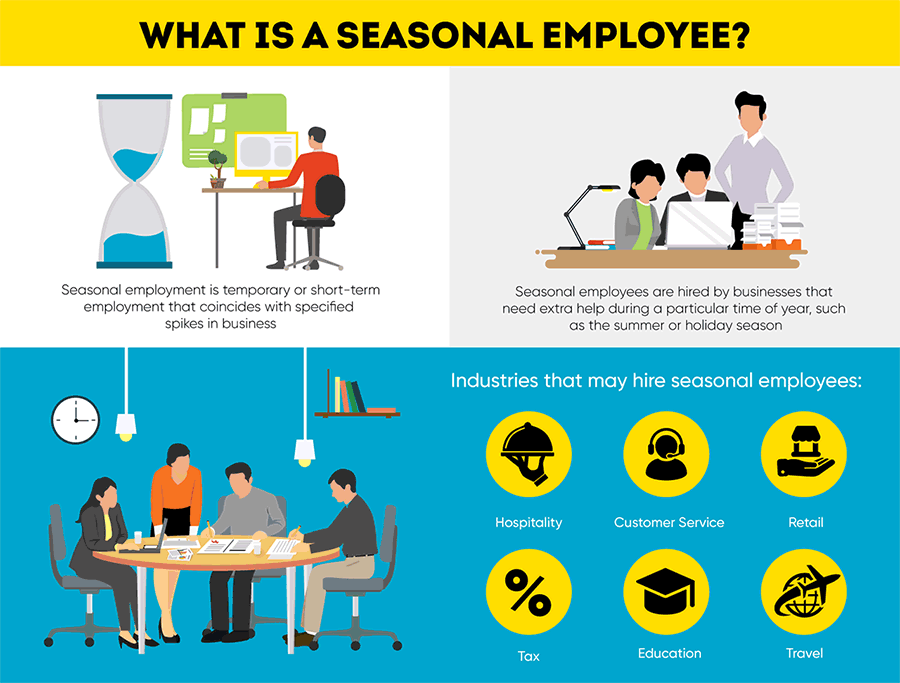Thriving in Seasonal Employment: Strategies for Success
Seasonal workers are persons employed during specific seasons of the year to assist businesses in getting through their busiest periods; they are not full-time employees; instead, they are people searching for extra money or a flexible schedule. Some people rely on seasonal workers as their primary source of income or a way to get into the industry they wish to work in, while others use their flexible schedules and short-term work to supplement their income. Seasonal employment is prevalent in various businesses and niches, including retail and seasonal industries like swimming pools and ski resorts.

Defining Seasonal Work
Seasonal jobs are typically available during peak times for specific industries due to holiday seasons, weather patterns, or cultural events. You’ll usually find an uptick in these roles in areas such as retail during holiday shopping seasons, agriculture during harvest times, or tourism-centered towns during peak vacation months. These opportunities are more than temporary stints, they can be a strategic way to gain experience in various fields, meet different kinds of professionals, and earn income on a flexible schedule.
Many people don’t just stumble upon a seasonal job —they aim for it, seeking out cyclic periods where their services are most in demand and can take advantage of specific industry needs. If feasible, recruit your seasonal employees right before the busy season to allow them time to get settled in and learn the ropes before they go full steam ahead. Ensure your seasonal roles are well-defined and have a comprehensive job description.
Benefits and Challenges of Seasonal Jobs
Seasonal work can be a goldmine of opportunity, offering diverse experiences and environments that can add considerable depth to a professional profile. The ability to choose when to work—and to enjoy downtime—appeals to many. Seasonal jobs can also serve as a launchpad for those entering the workforce, providing an expedited track to gaining practical skills and job experience. Additionally, for those with an entrepreneurial spirit, these jobs can offer the flexibility to work on personal projects or businesses.
On the flip side, these positions can pose challenges, including the potential for irregular income and the lack of steady, employer-provided benefits like health insurance or retirement plans. Understanding the balance of benefits and drawbacks is fundamental to making sound employment decisions. Information about seasonal workforce patterns and economic effects may be found at the Bureau of Labor Statistics.
Effective Strategies for Finding Seasonal Jobs
Those who succeed in securing seasonal work do so through savvy searching and astute self-marketing. Early starting is critical—companies often search for seasonal workers months in advance. Utilizing online job boards, social media platforms, and company career pages is a smart tactic. Additionally, leveraging relationships can lead to recommendations or insider information about upcoming openings that might not be advertised yet. Seasonal work allows you to peek into an industry and understand its rhythms, which can be advantageous for future job searches or career moves. These roles may offer a foot in the door, allowing for a more permanent position if one proves to be a reliable and competent worker.
Preparing Your Application: Standing Out in the Crowd
Your application is more than a list of previous jobs; it is a narrative of your professional journey. Tailoring this narrative to fit the seasonal role you’re eyeing is crucial. Highlight experiences showcasing relevant skills and qualities, like adaptability or quick learning—desirable traits for employers looking for seasonal help. In your cover letter, it’s critical to express your comprehension of the role’s requirements and how you’re the best candidate.
Your application materials should demonstrate that you’re not just looking for any job but this job. Furthermore, considering the rise of automated resume screening, applicants must be strategic in making their resumes AI-friendly. Advice from acclaimed sources can be instrumental in ensuring your resume stands out to human and digital eyes.
Read Also: Understanding brians club | The Web Marketplace for Data
Making the Most of Your Time During Employment
Landing the job is just the beginning. Seasonal employment is an excellent chance to show an employer your capabilities. It could mean taking initiative, showing eagerness to learn, and being flexible with your schedule and tasks. It’s also an excellent opportunity to network and establish relationships with coworkers and supervisors, which can be invaluable for future job searches or references. Employees who consistently perform well and make a positive impression could be offered extended employment or a permanent role. Hence, treating every day as an opportunity to prove yourself is essential.
Leveraging Seasonal Work for Career Advancement
A seasonal job can serve as fertile ground for growing your career. It allows you to develop a new skill set, learn about different industries, and build a professional network. Strategies for leveraging seasonal work include seeking out roles that have the potential to turn into longer-term opportunities or choosing positions that align closely with your career goals. This kind of work can provide unique experiences that distinguish your resume from others. It may lead to more permanent positions in the future, whether within the same organization or in a new field entirely.
Conclusion: Embracing Flexibility for Future Success
Embracing the nature of seasonal jobs means seeing them as temporary means to ends and meaningful engagements that contribute to your long-term professional story. These jobs can be rich with learning opportunities, networking potential, and the chance to discover new interests and passions. They offer a unique brand of employment freedom that, when tactically harnessed, can lead to substantial career growth and a more fulfilling work life. In conclusion, when approached with the right mindset, strategic planning, and a commitment to value each role as an essential career milestone, seasonal jobs can provide more than work—they can offer a viable path to a successful and adaptable career trajectory.




